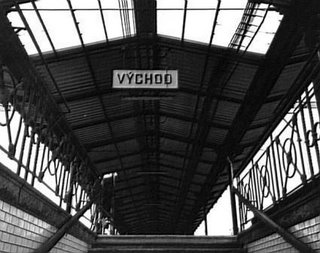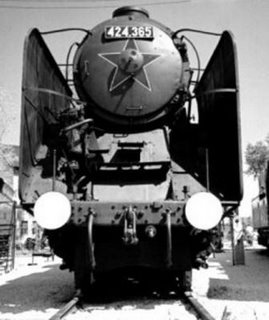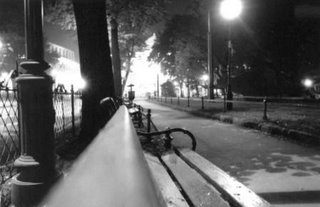Through An Open Door

It is a dull and wet Saturday in Debrecen; from my hotel window I watch the low, grey rainclouds skim the chimney tops of the power station behind the Palyvaudvar. By lunchtime almost everything in the city will be closed or closing, the streets empty, the shops shuttered. I walk into town and spend the morning in the internet cafe, until that too closes. I catch one of the few afternoon trams back to my hotel and sit in the sagging armchair and read. I walk over to the station mid-afternoon and buy a drink in the Bufe. There is something deeply melancholy about a grey weekend in Central Europe; its as if the town and it's people have just given up and left Debrecen to the rain and the falling autumn leaves. There are no trains for me to catch today; the station is still busy, though. People come in from the countryside to the town's markets on a Saturday morning - their once weekly shopping trip - and carry their loads back to the station for the train home. The trains are infrequent, and people settle in to wait for hours for the only departure to their village or halt. I sit in a corner of the Bufe where I can look through the open door into the booking hall. To my left are the windows over the platform and I watch as an M62 stops to change drivers in the station. It has been rebuilt - the staggered cab doors moved, air-conditioning radiators fitted, it's engine silenced and it's bodywork painted - and it seems reduced by this: the Russian bear tamed, it's appearance and behavior altered, domesticated, made more acceptable.
Through the Bufe's open door I watch as three women spread out a blanket and sit along one wall of the booking hall; the faces beneath their headscarves are dark and deeply lined - they are, I think, Romanians from the countryside - and they sit upright with legs straight out as they lay out a meal of black bread and dark, fatty sausage. They build a protective wall around their camp of bulging woven nylon sacks - much like the blue and white laundry sacks you would see in Britain - and endure the stares of passers-by with blank features. An old man with a greasy homburg and dirt-encrusted fingernails sits at my table, his overcoat reeking of stale food, and drinks a glass of Borok; through the Bufe door I see his wife silently watching him, waiting outside for him to finish his drink, surrounded by bags of shopping. He does not hurry, and she makes no complaint.
The Bufe door is always open. Now a younger man walks in and joins the queue at the counter. His jeans are too long and he has turned them up on the outside; the hems wobble just below his knees as he throws his head back and downs a glass of vodka in one swallow and leaves. He has a thin multi-coloured shell top over a faded lumber-shirt, and his brown plastic shoes are split at the heels. There is an air of despair around the people in the Bufe; when I look into the eyes of a man who hovers at the counter drinking shot after shot of some clear spirit, I am reminded of Don McCullin's photograph of the Marine at Hue. If I could read his thoughts, would they be about a new lover, a promotion, an unexpected windfall, or would the only thing going through his mind be what is the point? Another man stands just outside the Bufe door and counts out his loose change, glancing from the pricelist to his small handful of Forint coins; his cheap holdall is crammed with cabbages, bread, and bags of pale ill-shaped pasta, the thin metal clasps at the handles pulling apart under the strain, the zipper toothless and gaping. He affords a small glass of Borok diluted with tonic water; the plastic lenses of his thick glasses are yellowed and scratched, the sunset-red eyes behind them magnified horrifically. For these people the Bufe is some respite, and the train a lifeline. All those seemingly pointless, perfunctory stops on the way to Putnock or between Kosice and Debrecen are for people like these. An old Wartburg or tiny Polski Fiat 126 is an aspiration these people cannot afford to have, and the local train to town is the only means escape from the village or housing scheme, even if only for a few hours. In Britain, the rail traveling public are those who can afford the price privatisation has levied; in Central Europe it is the people that capitalism has left behind who travel by train.
As I walk through the Bufe's open door I see a little boy surrounded by cotton pillowcases stuffed with empty Coca-Cola cans and discarded plastic mineral water bottles, collected from the litter-bins of Debrecen to be sold for recycling; he chews distractedly at a crust of stale bread while he guards the bags: his parents are getting drunk at the booth outside the station.
For a moment, I think of turning and closing the Bufe's door behind me; I feel sympathy for these lost people, and realise that to close the door on them would be to close my mind to what I see around me.
I walk to the Non-Stop and buy six bottles of Borsodi to take back to my room. It is still raining and the pavements are slick and washed with reflected streetlight, empty, uninviting. I walk straight past the Etterem, go upstairs and draw the curtains, and set about drinking myself to sleep.






